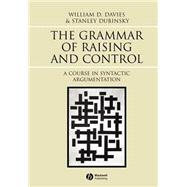
William D. Davies is Professor of Linguistics at the University of Iowa and is author of Choctaw Verb Agreement and Universal Grammar (1986).
Stanley Dubinsky is Associate Professor of Linguistics at the University of South Carolina. He is co-editor of Objects and Other Subjects: Grammatical Functions, Functional Categories, and Configurationality (with William D. Davies, 2001).
| Preface | vii | ||||
| Acknowledgments | x | ||||
| Unit I Classical Transformational Grammar | 1 | (104) | |||
|
1 | (104) | |||
|
3 | (14) | |||
|
17 | (13) | |||
|
30 | (30) | |||
|
35 | (25) | |||
|
60 | (29) | |||
|
62 | (27) | |||
|
89 | (16) | |||
| Unit II Extensions and Reinterpretations of Standard Theory | 105 | (70) | |||
|
105 | (70) | |||
|
107 | (30) | |||
|
108 | (29) | |||
|
137 | (38) | |||
|
138 | (37) | |||
| Unit III Government and Binding Theory | 175 | (98) | |||
|
175 | (68) | |||
|
177 | (23) | |||
|
200 | (43) | |||
|
209 | (34) | |||
|
243 | (30) | |||
| Unit IV The Minimalist Program | 273 | (90) | |||
|
273 | (2) | |||
|
275 | (24) | |||
|
299 | (33) | |||
|
300 | (32) | |||
|
332 | (31) | |||
| References | 363 | (11) | |||
| Name Index | 374 | (3) | |||
| Subject Index | 377 |
The New copy of this book will include any supplemental materials advertised. Please check the title of the book to determine if it should include any access cards, study guides, lab manuals, CDs, etc.
The Used, Rental and eBook copies of this book are not guaranteed to include any supplemental materials. Typically, only the book itself is included. This is true even if the title states it includes any access cards, study guides, lab manuals, CDs, etc.